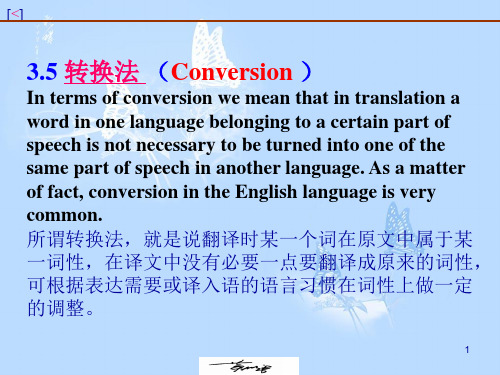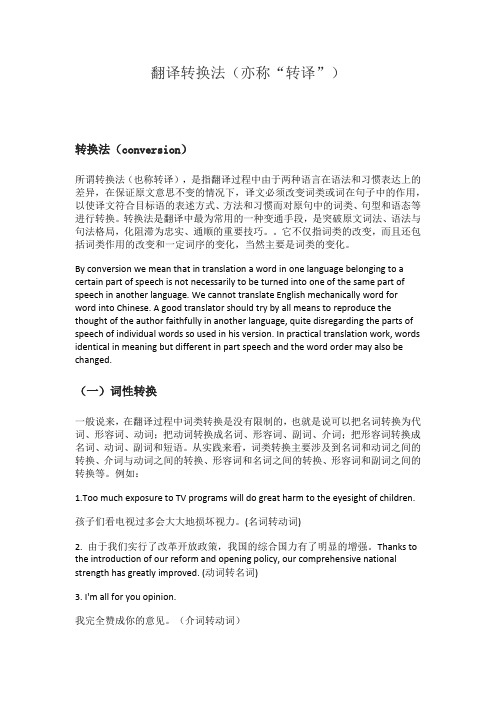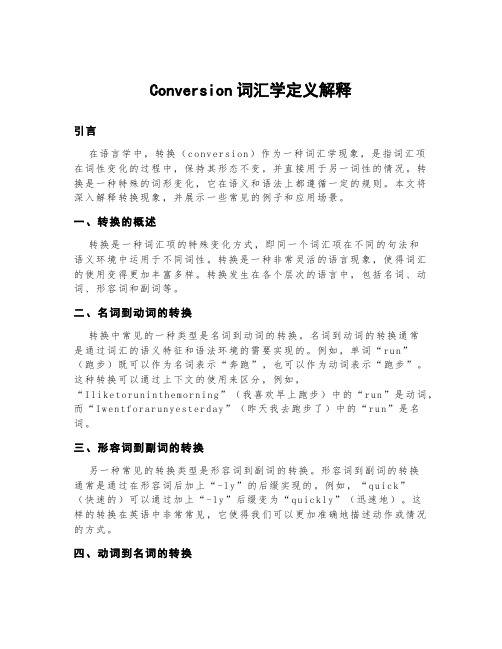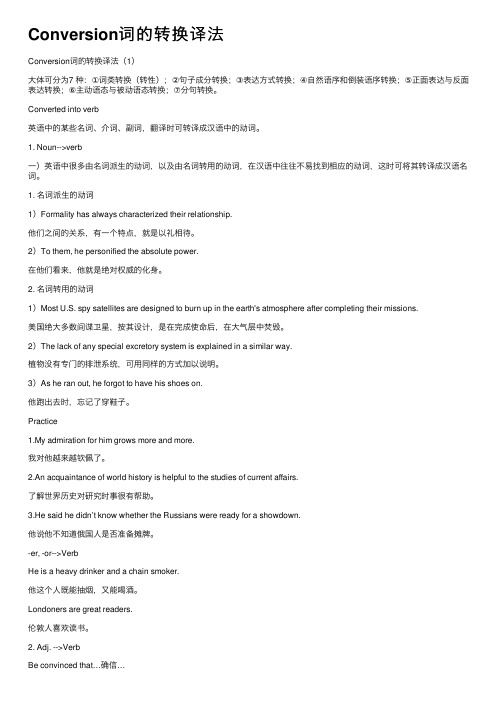Conversion 词性的转换
英语词性之间的转换与重译解析

[<]
B. Adjectives—Adverbs 3. He had a careful study of the map before he started off.
他在出发前仔细地看了看地图。
4. Can you give an accurate translation of the sentence? 你能准确地把这句话译出来吗?
社论说…… 2. He is strong physically, but weak mentally. 他体力很强,可智力很弱。
3. It is officially announced that Paris is invited to the meeting.
官方宣布,巴黎应邀出席会议。
12
[<]
他倒是不抽烟,但他的爸爸却一支接一支地抽(是个 老烟枪)。
6. He was a regular visitor.
他经常来。 7. He is a good eater and good sleeper. 他能吃能睡。
4
[<]
C. 介词转换为动词
8. Millions of the people in the mountainous areas are finally off poverty. 千百万山区人终于摆脱了贫穷。 9. He came to my home for help. 他来到我家,请求帮助。 10. The woman, with her two daughters, arrived. 这妇女带着她的两个女儿道了。
20
[<]
1. 重复名词
大家都知道, 英语句中若两个动词
共用一个宾语,宾语只在第二个动词之后出现一次。 而在汉语中,这样的宾语要在每个动词后出现,定语 后的名词也如此。 重复动词后的宾语名词,如: 1). We have to analyze and solve problems. 我们要分析问题,解决问题。 2). Let us revise our safety and sanitary regulations. 我们来修改安全规则和卫生规则吧。
翻译转换法(亦称“转译”)

翻译转换法(亦称“转译”)转换法(conversion)所谓转换法(也称转译),是指翻译过程中由于两种语言在语法和习惯表达上的差异,在保证原文意思不变的情况下,译文必须改变词类或词在句子中的作用,以使译文符合目标语的表述方式、方法和习惯而对原句中的词类、句型和语态等进行转换。
转换法是翻译中最为常用的一种变通手段,是突破原文词法、语法与句法格局,化阻滞为忠实、通顺的重要技巧。
它不仅指词类的改变,而且还包括词类作用的改变和一定词序的变化,当然主要是词类的变化。
By conversion we mean that in translation a word in one language belonging to a certain part of speech is not necessarily to be turned into one of the same part of speech in another language. We cannot translate English mechanically word for word into Chinese. A good translator should try by all means to reproduce the thought of the author faithfully in another language, quite disregarding the parts of speech of individual words so used in his version. In practical translation work, words identical in meaning but different in part speech and the word order may also be changed.(一)词性转换一般说来,在翻译过程中词类转换是没有限制的,也就是说可以把名词转换为代词、形容词、动词;把动词转换成名词、形容词、副词、介词;把形容词转换成名词、动词、副词和短语。
conversion词汇学定义解释

Conversion词汇学定义解释引言在语言学中,转换(c o nv er si on)作为一种词汇学现象,是指词汇项在词性变化的过程中,保持其形态不变,并直接用于另一词性的情况。
转换是一种特殊的词形变化,它在语义和语法上都遵循一定的规则。
本文将深入解释转换现象,并展示一些常见的例子和应用场景。
一、转换的概述转换是一种词汇项的特殊变化方式,即同一个词汇项在不同的句法和语义环境中运用于不同词性。
转换是一种非常灵活的语言现象,使得词汇的使用变得更加丰富多样。
转换发生在各个层次的语言中,包括名词、动词、形容词和副词等。
二、名词到动词的转换转换中常见的一种类型是名词到动词的转换。
名词到动词的转换通常是通过词汇的语义特征和语法环境的需要实现的。
例如,单词“r un”(跑步)既可以作为名词表示“奔跑”,也可以作为动词表示“跑步”。
这种转换可以通过上下文的使用来区分,例如,“I li ke to ru ni nt he m or ni ng”(我喜欢早上跑步)中的“r u n”是动词,而“Iw en tf or ar uny e st er da y”(昨天我去跑步了)中的“r u n”是名词。
三、形容词到副词的转换另一种常见的转换类型是形容词到副词的转换。
形容词到副词的转换通常是通过在形容词后加上“-l y”的后缀实现的。
例如,“q u ic k”(快速的)可以通过加上“-ly”后缀变为“qu ic kl y”(迅速地)。
这样的转换在英语中非常常见,它使得我们可以更加准确地描述动作或情况的方式。
四、动词到名词的转换除了名词到动词的转换外,动词到名词的转换也是一种常见的现象。
动词到名词的转换通常通过加上特定后缀实现,例如,“a rri v e”(到达)可以通过加上“-a l”后缀变为“a rr i va l”(到达)。
这种转换使得我们可以将动作或状态转化为一个名词,从而更好地描述或引用某种特定情况。
五、应用场景转换概念在日常语言中经常被使用,我们可以在各种语言环境和书面文本中找到转换的例子。
英语中的构词法(资料版)

初中英语构词法一、构词法转化法(conversion)、合成法(Compounding)和派生法(Conversion)。
1.转化法(conversion)在英语中,一个单词由一种词性转化为另一种或几种词性而词形不变的方法叫做转化法。
1. 动词转化为名词●Let me have a try. 让我试试。
●They are only allowed to sell soft drinks at school.在学校里只准许他们出售不含酒精的饮料。
2. 名词转化为动词●He shouldered his way through the crowd. 他用肩膀推开人群前进。
●The smell from the kitchen made his mouth water. 从厨房传来的气味使他流口水。
3. 形容词转化为动词●We will try our best to better our living conditions.我们要尽力改善我们的生活状况。
●They tried to perfect the working conditions.他们努力改善工作条件。
4. 形容词转化为名词●He didn’t know the difference between right and wrong. 他不辨是非。
●The old in our village are living a happy life. 我们村的老年人过着幸福的生活。
5. 形容词转化为副词●How long have you lived there?你在那儿住多久了?6. 个别词在一定场合中可转化为名词●Warm clothes are a must in the mountains.穿暖和的衣服到山区去是必须的。
●Life is full of ups and downs. 人生有得意时也有失意时。
●His argument contains too many ifs and buts. 他的辩论中含有太多的“如果”和“但是”。
翻译转换法(亦称“转译”)

翻译转换法(亦称“转译”)转换法(conversion)所谓转换法(也称转译),是指翻译过程中由于两种语言在语法和习惯表达上的差异,在保证原文意思不变的情况下,译文必须改变词类或词在句子中的作用,以使译文符合目标语的表述方式、方法和习惯而对原句中的词类、句型和语态等进行转换。
转换法是翻译中最为常用的一种变通手段,是突破原文词法、语法与句法格局,化阻滞为忠实、通顺的重要技巧。
它不仅指词类的改变,而且还包括词类作用的改变和一定词序的变化,当然主要是词类的变化。
By conversion we mean that in translation a word in one language belonging to a certain part of speech is not necessarily to be turned into one of the same part of speech in another language. We cannot translate English mechanically word for word into Chinese. A good translator should try by all means to reproduce the thought of the author faithfully in another language, quite disregarding the parts of speech of individual words so used in his version. In practical translation work, words identical in meaning but different in part speech and the word order may also be changed.(一)词性转换一般说来,在翻译过程中词类转换是没有限制的,也就是说可以把名词转换为代词、形容词、动词;把动词转换成名词、形容词、副词、介词;把形容词转换成名词、动词、副词和短语。
Conversion词的转换译法

Conversion词的转换译法Conversion词的转换译法(1)⼤体可分为7 种:①词类转换(转性);②句⼦成分转换;③表达⽅式转换;④⾃然语序和倒装语序转换;⑤正⾯表达与反⾯表达转换;⑥主动语态与被动语态转换;⑦分句转换。
Converted into verb英语中的某些名词、介词、副词,翻译时可转译成汉语中的动词。
1. Noun-->verb⼀)英语中很多由名词派⽣的动词,以及由名词转⽤的动词,在汉语中往往不易找到相应的动词,这时可将其转译成汉语名词。
1. 名词派⽣的动词1)Formality has always characterized their relationship.他们之间的关系,有⼀个特点,就是以礼相待。
2)To them, he personified the absolute power.在他们看来,他就是绝对权威的化⾝。
2. 名词转⽤的动词1)Most U.S. spy satellites are designed to burn up in the earth's atmosphere after completing their missions.美国绝⼤多数间谍卫星,按其设计,是在完成使命后,在⼤⽓层中焚毁。
2)The lack of any special excretory system is explained in a similar way.植物没有专门的排泄系统,可⽤同样的⽅式加以说明。
3)As he ran out, he forgot to have his shoes on.他跑出去时,忘记了穿鞋⼦。
Practice1.My admiration for him grows more and more.我对他越来越钦佩了。
2.An acquaintance of world history is helpful to the studies of current affairs.了解世界历史对研究时事很有帮助。
conversion词性的转换
Conversion 词性的转换Aims: how to use the technique of conversion in the process of translation Key points: definition of conversion, application of conversionDifficulties: application of conversion in the process of translation Teaching procedures:Generally speaking, a translator is not supposed to change the parts of speech 词性of the original work at will. However, because English and Chinese are two entirely different languages, a translator should not follow the parts of speech of the original mechanically. As a matter of fact, a word in one language belonging to a certain part of speech has often to be converted into a different part of speech to conform to the usage of the language to be translated into. And this is what“conversion” means.•So by “conversion” we mean that in translation a word in the source language belonging to a certain part of speech is not necessarily to be turned into the same part of speech in the target language.•Conversion is one of the important techniques and is needed primarily by the difference in syntactic syntactic adj.依据造句法的structure and idiomatic ways in the two languages. That‘s to say English and Chinese differ greatly in manner of expression. •Chinese: more verbs and fewer nouns and prepositions are used than in English.•English: more nouns and prepositions and fewer verbs are used than in Chinese.•This phenomenon appears to be just a difference in the use of different parts of speech, but in fact it shows thespecial features of either language in diction, syntax, conventional ways of expression, etc.•Secondly, as in the case of English , some words in nouns or adjective forms are often used to express the idea of action, thus serving as verbs.***1. English nouns into Chinese verbs or vice versa•(1) English into Chinese•The Chinese language has a sentence construction with consecutiv连续的, 联贯的 predicates 谓语by which verbs can be used freely, so it often occurs that several verbs appear in a row in a Chinese sentence. For example:• happiness of having such a sister was their first effusion,and the fair ladies mingled in embraces and tears of joy.•她们首先倾吐了要做姑嫂的喜悦,两位小姐高兴地一次次拥抱,洒下了欣喜的泪花.• Thought of the terrible scene made his flesh creep.•一想到那可怕的景象他就毛骨悚然.•3. The application of computers makes for a tremendous rise in labor productivity.•使用计算机可以大大提高劳动生产率.• has no such natural protection from a flood of Hollywood products.•英国没有这种天然的保护来阻挡好来坞影片长驱直入.•5. It is my conviction n.深信, 确信, 定罪, 宣告有罪that though men may be no more wicked than they always have been, they seem less likely to be ashamed. 1,conviction n.深信, 确信, 定罪, 宣告有罪2,wicked adj.坏的, 邪恶的, 缺德的, 不道德的, 恶劣的, 刻毒的, 淘气的•我相信,人们虽然未必比以前还要不讲道德,但似乎要比以前更加不知羞耻.(2) Chinese into English•据商业部最近预测,今年全国市场需要家用电冰箱一百万台,十年内将持续增长.•National demand for home refrigerators, estimated at one million this year, will keep rising within the next ten years, according to a recent forecast by the ministry of Commerce.•我未必会教你游泳,我想我的小弟弟比我教得好.•I am afraid I can’t teach you swimming.I think my little brother is a better teacher than I.2. English prepositions into Chinese verbs or vice versa•In many cases, prepositions in English can be used to replace Chinese verbs. This method can make our English translation terse and comply with English usage. For example:•1. I saw that his face was pale. I followed his eyes and looked across the room to a woman who was setting a trayof drinks before some customers.•我见他脸色煞白. 我循着他的目光,看见餐厅那边有个女人端着托盘给几位客人上饮料.•So the following examples will reveal the importance of conversion from English prepositions into Chinese verbs and vice versa.•!” Away she skimmed over the lawn, up the path, up the steps, across the veranda,.阳台, 走廊and into the porch.•2. The computer is of high sensibility. Sensibility n.敏感性•3. Machine parts of irregular shape can be washed very clean by ultrasonics. ultrasonics n.超音波学•4 The shaft 转动轴turns about its axis.3. Conversion of English adjectives to Chinese verbs•(1) English into Chinese•Some Adjectives In English that form Complete predicates with link verbs should be converted to verbs in Chinese. They denote vt.指示, 表示such Psychological states as perception感觉, sentiment sentiment n.情操, 情感, 情绪, 观点, 多愁善感, 感情, conception, desire, consciousness etc. For example:•1. With the unemployment high , the dollar low, and the stock market in distress, the economy became the President’s sternest严峻的 trial.•随着失业人数的增长,美圆的贬值,股票市场的不景气,经济问题成了总统最严峻的考验.•2. This student is not content with his progress.•这个学生不满足于自己所取得的进步.• fact that she was able to send a message was a hint . But I had to be cautious.•她能够给我带信这件事是个暗示.但我还得小心谨慎才是.• have said that they are not sure they can save his life.•医生们说他们不敢肯定能否救得了他的命.•Such adjectives in common use include: convinced 相信certain 确定glad 高兴afraid 害怕anxious渴望doubtful 怀疑aware 觉察ashamed 惭愧careful 当心delightedsorry 可惜 ignorant 不知道thankful 感谢confident 深信 content 满足(2)Chinese to English1. 他非常热爱科学研究,但对晋级提升毫无兴趣.•He is keen on scientific research butindifferent to promotion.•2. 她宽宏大量,富于同情心, 并且顺从听话.•She is tolerant, sympathetic and obedient.(4)Conversion of nouns in Chinese to verbs In English and Vice versa•In translation it often happens that Chinese Verbs are converted to English nouns. In other cases however, the opposite is true , that is , Chinese nouns are converted to English verbs. For example:•(1) Chinese to English•1.在张家界时我们看到一个高耸的岩石, 它的形状像是一根金鞭.•When we were at Zhangjiajie , we saw a towering towering .高耸的, 杰出的, 激烈的rock which was shaped like a golden whip.• 2. 气体和固体的区别,在于前者比后者有更大的压缩性.•Gases differ from solids in that the former have greater compressibility than the latter.•3我本不敢开口提这事, 可是他信里的口气十分严厉.•I didn’t really want to mention it , but he sounded very serious in his letter.•4. 这类计算机的发明是他们在科学中所取得的伟大成就的象征.•The invention of this kind of computers symbolizes the great achievements they have made in science.(2)English to Chinese•1. The products of this small factory are characterized by their fine workmanship and durability.•这个小厂产品的主要特点是工艺精湛,经久耐用.• operation of a machine needs some knowledge of its performance.•操作机器需要懂得机器的一些性能.•3. The volume of trade has increased tremendously, the advantage of both countries.•贸易额有了很大的增长,这给两国都带来了好处.5 When nouns in English are translated into verbs in Chinese , the adjectives modifying the former are usually changed to adverbs in the other language .•. Occasionally a drizzle came down , and the intermittent flashes of lightening made us turn apprehensive glances toward Zero.•偶尔下一点毛毛雨,断断续续的闪电使得我们不时忧虑地朝着零区方向望去。
conversion转译法
e.g. 1) Party officials worked long hours on meagre food, in cold caves, by dim lamps. 党的干部们吃着粗茶淡饭,住着冰冷的窑 洞,点着昏暗的油灯,长时间地工作 2) The government of the people, by the people, for the people, shall not perish from the earth. 民有、民治、民享的政府将永存于世
五、副词的转换
1. 副词→动词 1)The manager will be back in about an hour. 经理大约在一小时后回来 2)When the crops are in, they start autumn sowing. 庄稼收完后,他们开始秋种 3)As he ran out, he forgot to have his shoes on. 他跑出去时,忘记了穿鞋子 4)She opened the window to let fresh air in 她把窗子打开,让新鲜空气进来
4. Such materials are characterized by good insulation and high resistance to wear.
这种材料的特点是绝缘性好并且耐磨性强
5. The design aims at automatic operation, easy regulation, simple maintenance and high productivity. 这项设计的目标是自动操作、调节简单、 维护简易、生产率高
2. The audience laughed the speaker down. 听众用讪笑声把演讲者轰下台 3. They signed two agreements that served to warm up the atmosphere of their relations. 他们签署了两个协定,目的是使他们的关 系热乎起来
英语词性之间的转换与重译解析
[<]
重复英语中省略的名词,起到强调和明确的作用, 更符合译语习惯
1). I have fulfilled my assigned work ahead of schedule, so has he.
我已经提前完成了交给我的工作,他也提前完成了交 给他的工作。
10
6. 她非常漂亮。 She is a real beauty. 7. 那个家伙笨的出奇。 That fellow is a typical fool.
8. 你说他傻不傻? Don’t you think he is an idiot?
11
[<]
C. Adverbs—Nouns
1. It is editorially said that…
9
[<]
3. Stevenson was eloquent and elegant—but soft.
史蒂文森有口才、有风度,但很软弱。
4. This problem is no less important than that one.
这个问题的重要性不亚于那个问题。 5. Glass is more transparent than plastic cloth. 玻璃的透明度比塑料布要好。
phrases which are given previously in the version. Repetition is employed for the sake of clearness, for the
sake of emphasis, and for the sake of vividness.
19
[<]
3.6 Repetition (重译法)
Conversion转性译法
6). Britain has no such natural protection from a flood of Hollywood products. 英国没有这种天然的保护来阻挡好莱坞影片长驱直 入。
1.Conversion to Chinese Verbs (转化为汉语动词)
(1). N. Converted into V.(名—动)
Nouns and noun forms, especially action nouns and other abstract nouns, find their wider use in forms are much preferred in Chinese.
转性译法—在翻译过程中,在保证原文意义不变的
前提下,根据语言的习惯进行词性转换,以确保 译文通顺流畅。
2. Types of Conversion
1). Parts of speech 2). Sentence elements
A. Conversion in E-C Translation I. Conversion of parts of speech 词类转换
1). His very appearance at any affair proclaims it a triumph.
任何事情,他只要露面,就可大功告成。
2). Rockets have found wide application for the exploration of the universe. 火箭已经广泛用于探索宇宙
- 1、下载文档前请自行甄别文档内容的完整性,平台不提供额外的编辑、内容补充、找答案等附加服务。
- 2、"仅部分预览"的文档,不可在线预览部分如存在完整性等问题,可反馈申请退款(可完整预览的文档不适用该条件!)。
- 3、如文档侵犯您的权益,请联系客服反馈,我们会尽快为您处理(人工客服工作时间:9:00-18:30)。
Conversion 词性的转换Aims: how to use the technique of conversion in the process of translationKey points: definition of conversion, application of conversionDifficulties: application of conversion in the process of translationTeaching procedures:Generally speaking, a translator is not supposed to change the parts of speech词性of the original work at will. However, because English and Chinese are two entirely different languages, a translator should not follow the parts of speech of the original mechanically. As a matter of fact, a word in one language belonging to a certain part of speech has often to be converted into a different part of speech to conform to the usage of the language to be translated into. And this is what “conversion” means.•So by “conversion” we mean that intranslation a word in the source language belonging to a certain part of speech is not necessarily to be turned into the same part of speech in the target language.•Conversion is one of the important techniques and is needed primarily by the difference in syntactic syntactic adj.依据造句法的structure and idiomatic ways in the two languages. That…s to say English and Chinese differ greatly in manner of expression. •Chinese: more verbs and fewer nouns and prepositions are used than in English. •English: more nouns and prepositions and fewer verbs are used than in Chinese.•This phenomenon appears to be just a difference in the use of different parts of speech, but in fact it shows the special features of either language in diction, syntax, conventional ways of expression, etc.•Secondly, as in the case of English , some words in nouns or adjective forms are oftenused to express the idea of action, thus serving as verbs.***1. English nouns into Chinese verbs or vice versa•(1) English into Chinese•The Chinese language has a sentence construction with consecutiv连续的, 联贯的predicates 谓语by which verbs can be used freely, so it often occurs that several verbs appear in a row in a Chinese sentence. For example:•1.The happiness of having such a sister was their first effusion, and the fair ladies mingled in embraces and tears of joy.•她们首先倾吐了要做姑嫂的喜悦,两位小姐高兴地一次次拥抱,洒下了欣喜的泪花. •2.The Thought of the terrible scene made his flesh creep.•一想到那可怕的景象他就毛骨悚然.•3. The application of computers makes for a tremendous rise in labor productivity.•使用计算机可以大大提高劳动生产率.•4.Britain has no such natural protection from a flood of Hollywood products.•英国没有这种天然的保护来阻挡好来坞影片长驱直入.•5. It is my conviction n.深信, 确信, 定罪, 宣告有罪that though men may be no more wicked than they always have been, they seem less likely to be ashamed. 1,conviction n.深信, 确信, 定罪, 宣告有罪2,wicked adj.坏的, 邪恶的, 缺德的, 不道德的, 恶劣的, 刻毒的, 淘气的•我相信,人们虽然未必比以前还要不讲道德,但似乎要比以前更加不知羞耻.(2) Chinese into English•eg.1 据商业部最近预测,今年全国市场需要家用电冰箱一百万台,十年内将持续增长. •National demand for home refrigerators, estimated at one million this year, will keep rising within the next ten years, according to a recent forecast by the ministry of Commerce. •eg.2我未必会教你游泳,我想我的小弟弟比我教得好.•I am afraid I can‟t teach you swimming. I think my little brother is a better teacher than I.2. English prepositions into Chinese verbs or vice versa•In many cases, prepositions in English can be used to replace Chinese verbs. This method can make our English translation terse and comply with English usage. For example: •1. I saw that his face was pale. I followed his eyes and looked across the room to a woman who was setting a tray of drinks before some customers.•我见他脸色煞白. 我循着他的目光,看见餐厅那边有个女人端着托盘给几位客人上饮料.•So the following examples will reveal the importance of conversion from English prepositions into Chinese verbs and vice versa.•ing!” Away she skimmed over the lawn,up the path, up the steps, across the veranda,.阳台, 走廊and into the porch.•2. The computer is of high sensibility. Sensibility n.敏感性•3. Machine parts of irregular shape can be washed very clean by ultrasonics. ultrasonics n.超音波学•4 The shaft 转动轴turns about its axis.3. Conversion of English adjectives to Chinese verbs•(1) English into Chinese•Some Adjectives In English that form Complete predicates with link verbs should be converted to verbs in Chinese. They denote vt.指示, 表示such Psychological states as perception感觉, sentiment sentiment n.情操, 情感, 情绪, 观点, 多愁善感, 感情, conception, desire, consciousness etc. For example:•1. With the unemployment high , the dollar low, and the stock market in distress, the economy became the President‟s sternest严峻的trial.•随着失业人数的增长,美圆的贬值,股票市场的不景气,经济问题成了总统最严峻的考验. •2. This student is not content with his progress.•这个学生不满足于自己所取得的进步. •3.The fact that she was able to send a message was a hint . But I had to be cautious.•她能够给我带信这件事是个暗示.但我还得小心谨慎才是.•4.Doctors have said that they are not sure they can save his life.•医生们说他们不敢肯定能否救得了他的命.•Such adjectives in common use include: convinced 相信certain 确定glad 高兴afraid 害怕anxious渴望doubtful 怀疑aware 觉察ashamed 惭愧careful 当心delightedsorry 可惜ignorant 不知道thankful 感谢confident 深信content 满足(2)Chinese to English1. 他非常热爱科学研究,但对晋级提升毫无兴趣.•He is keen on scientific research but indifferent to promotion.•2. 她宽宏大量,富于同情心, 并且顺从听话. •She is tolerant, sympathetic and obedient. (4)Conversion of nouns in Chinese to verbs In English and Vice versa•In translation it often happens that Chinese Verbs are converted to English nouns. In other cases however, the opposite is true , that is , Chinese nouns are converted to English verbs. For example:•(1) Chinese to English•1.在张家界时我们看到一个高耸的岩石, 它的形状像是一根金鞭.•When we were at Zhangjiajie , we saw atowering towering .高耸的, 杰出的, 激烈的rock which was shaped like a golden whip. •2. 气体和固体的区别,在于前者比后者有更大的压缩性.•Gases differ from solids in that the former have greater compressibility than the latter. •3我本不敢开口提这事, 可是他信里的口气十分严厉.•I didn‟t really want to mention it , but he sounded very serious in his letter.•4. 这类计算机的发明是他们在科学中所取得的伟大成就的象征.•The invention of this kind of computers symbolizes the great achievements they have made in science.(2)English to Chinese•1. The products of this small factory are characterized by their fine workmanship and durability.•这个小厂产品的主要特点是工艺精湛,经久耐用.•2.The operation of a machine needs someknowledge of its performance.•操作机器需要懂得机器的一些性能.•3. The volume of trade has increased tremendously, the advantage of both countries. •贸易额有了很大的增长,这给两国都带来了好处.5 When nouns in English are translated into verbs in Chinese , the adjectives modifying the former are usually changed to adverbs in the other language .•E.g. Occasionally a drizzle came down , and the intermittent flashes of lightening made us turn apprehensive glances toward Zero.•偶尔下一点毛毛雨,断断续续的闪电使得我们不时忧虑地朝着零区方向望去。
